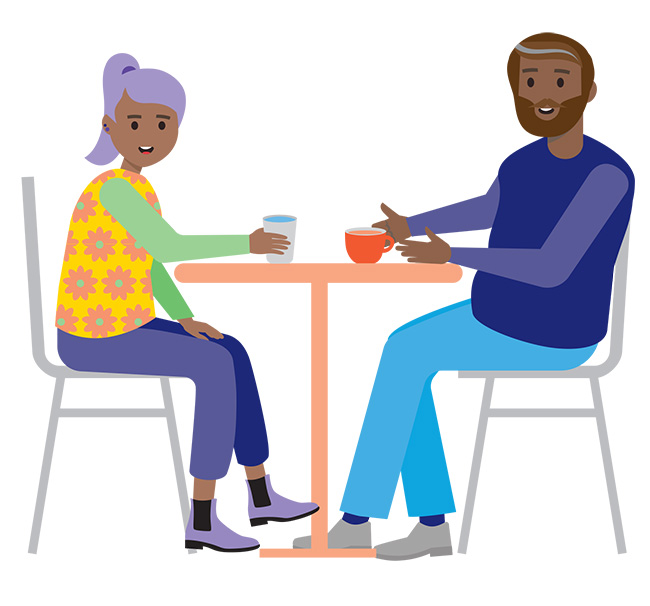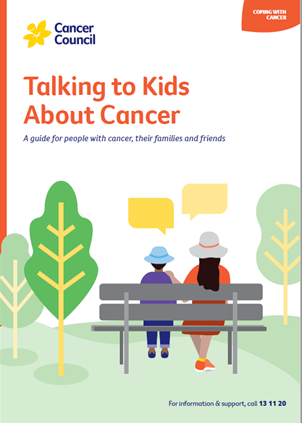- Home
- Cancer Information
- Family and friends
- Talking to kids about cancer
- Talking about the diagnosis
Talking about the diagnosis
In this section we answer common questions people may have about talking about their diagnosis with their children.
Learn more about:
- When should I tell my children?
- Where should I tell my children?
- Should I tell them together?
- Who should tell my children?
- Looking after yourself
- How can I prepare?
- What do children need to know?
- Coping with kids’ reactions
- If your child is diagnosed
- When a sibling has cancer
- When another child has cancer
- Answering key questions
- What words should I use?
- Involving others
- Involving the school or preschool

When you first learn of a cancer diagnosis, you may feel shocked and overwhelmed. Among the many decisions you need to make will be when, where and how to talk to the children and young people in your life. Try to think of this as a series of conversations that evolve over time, rather than a one-off discussion. However you decide to approach these conversations, try to be open and leave kids with a feeling of realistic hope.
When should I tell my children?
It’s common to feel unsure about the best time to tell your children; often there is no right time. You may wonder if you should tell them soon after you’ve been told yourself or wait until you have more details about test results and treatment.
Although it is tempting to delay talking to your kids, try to tell them as soon as you feel able. Keeping the diagnosis a secret can be stressful, and your children will probably sense that something is wrong.
It’s also a good idea to tell children if:
- you think they may have overheard a conversation
- they are scared by adults crying
- they are shocked or confused by physical or emotional changes in the person who has cancer, especially if the person has symptoms such as frequent vomiting, weight loss, hair loss, or is admitted to hospital for immediate treatment
- you notice changes in their behaviour.
It may be hard to know how much information to share, particularly if you are waiting on test results. Your children don’t need to hear everything all at once. If you don’t know what treatment is needed, just say so – but also assure your children that as soon as you have more information, you will tell them. For example, “Dad is in hospital having tests. We’re not sure what’s wrong, but we’ll tell you as soon as we know.”
Let children know it’s okay to have questions at different times, such as during treatment, and to talk about how they feel at any time.
Mum was driving us over to McDonald’s when she asked me about cancer and what I knew about it. Then she told me about Dad’s leukaemia – what it meant, what it was doing and how it would affect him. I was sitting in the car park feeling pretty overwhelmed.
JAMES, AGED 12
Where should I tell my children?
Many people find that bringing up the topic while doing something else – like walking the dog or washing dishes – can help reduce the tension. This approach may be less intimidating than sitting down for a formal discussion, particularly if this is unusual for your family.
Try to find a time when you won’t be interrupted or need to rush off without answering all your children’s questions. Talking to kids before bedtime, school or an important event may not be a good idea. Ideally, you should tell them at a time and in a place where they feel able to listen and take in the news. For example, you may have the discussion on a weekend, so kids have the time to process the information.
It’s important that children are in a place where they feel safe so they feel comfortable to express emotions such as sadness or anger.
Should I tell them together?
If you have more than one child, you may wonder whether you should tell them individually or together. This will depend on the ages and temperaments of your children. You may need to use different language because of their ages. If you decide to tell them separately, try to tell them on the same day. Asking older children to keep the diagnosis a secret from younger siblings can add to their stress.
Who should tell my children?
In most cases, it is easier if the information comes from someone who is close to your children. Ideally, that will be the parent who has cancer, with the support of a partner or other close family member. Families can use language their kids understand and reflect on shared experiences in explaining the cancer diagnosis. This can help young people to understand the situation.
However, this is not always possible. Another adult close to your children, such as a grandparent, aunt, uncle or friend, may be able to tell them or be present when you tell them. This may be particularly important if you’re a single parent. You may decide to share the news with the support of a member of your health care team, such as your general practitioner (GP) or hospital social worker.
Looking after yourself
Telling children and young people about a cancer diagnosis can be confronting and difficult. You may be facing emotional and physical challenges, and you will have to make many decisions, but you don’t have to do this alone.
If you are talking to a child about their diagnosis, or that of a sibling, it’s also important to recognise the intense anxiety that this can cause parents.
- Wait until your initial feeling of shock has eased and you feel better able to manage your response to questions before attempting the conversation.
- Don’t feel that you have to hide your feelings all the time. It is okay for children to see that you are upset at times.
- Talk to a few trusted adults beforehand – this will allow you to express your own feelings and start getting used to the news yourself.
- Make a list of things that other people can do for you. Family and friends are often keen to help out, but usually need guidance on what to do.
- Ask a friend to coordinate offers of help. Apps like Gather my Crew can be used, or in instances of childhood cancer, you may find the KiteCrew app helpful (search for Redkite on the App Store or Google Play).
Learn more about involving the school and others, and learn about support services.
→ READ MORE: How can I prepare?
Explaining Cancer to Kids
Listen to more episodes from our podcast for people affected by cancer
More resources
Prof Jane Turner AM, International Psycho-Oncology Society President Emeritus,The University of Queensland, QLD; Taylor Baker, Consumer; Dr Ben Britton, Principal Clinical and Health Psychologist, Head of Psychology, Hunter New England Mental Health, NSW; Camp Quality; Dr Lisa Cuddeford, Head of Department, WA Paediatric Palliative Care Service, Perth Children’s Hospital, WA; A/Prof Peter Downie, Head, Paediatric Haematology–Oncology and Director, Children’s Cancer Centre, Monash Children’s Hospital, VIC; Dr Sarah Ellis, Clinical Psychologist, Kids Cancer Centre, Sydney Children’s Hospital, NSW; Malia Emberson-Lafoa’i, Consumer; Kate Fernandez, 13 11 20 Consultant, Cancer Council SA; Jane Gillard, Consumer; Mary McGowan OAM, International Childhood Cancer Advocate, VIC; Annette Polizois, Senior Social Worker, Women, Family and Emergency Care Team, Royal North Shore Hospital, NSW; Rhondda Rytmeister, Clinical Psychologist, HeadWayHealth (formerly Snr Clinical Psychologist, The Cancer Centre for Children, Westmead, NSW); Nadine Street, Head of Social Work and Social Welfare, HNE Mental Health Service, NSW; Warren Summers, Online Counsellor, Canteen, NSW.
We would also like to thank the health professionals, consumers, organisations and editorial teams who have worked on previous editions of this title, and we are grateful to the parents and young people whose real-life stories have added to the richness and relevance of this book.
We thank and acknowledge Dr Paula K. Rauch, MD, Founder and Director, Marjorie E. Korff PACT (Parenting At a Challenging Time) Program and Associate Professor of Psychiatry, Harvard Medical School, whose research and writing on helping parents talk to their children about cancer was used as source material for this book and has been adapted in several sections: pages 8–11, How children understand cancer; page 22, Answering key questions: Are you going to die?; page 26, Involving the school or preschool; pages 30–31, Hospital visits; and pages 36–37, Encouraging family time. We also thank the American Cancer Society for permission to use and adapt material on pages 8-11 from its book Cancer in Our Family: Helping children cope with a parent’s illness (2013); Macmillan Cancer Support for permission to use its book Talking to Children and Teenagers When an Adult Has Cancer (2013) as a source of information; Jessica Watt, Oncology Social Worker, The Children’s Hospital at Westmead, for her contribution on page 20, When another child has cancer; and Diane McGeachy, Hobart Counselling Centre, for contributing material for page 37, Spending one-on-one time.
View the Cancer Council NSW editorial policy.
View all publications or call 13 11 20 for free printed copies.
Need to talk?
Support services
Coping with cancer?
Speak to a health professional or to someone who has been there, or find a support group or forum
Looking for transport, accommodation or home help?
Practical advice and support during and after treatment
Cancer information
Dealing with the diagnosis
Common reactions to a cancer diagnosis and how to find hope
Explore our resource hub
Explore and download our booklets, fact sheets, podcasts, webinars and videos for people affected by cancer

